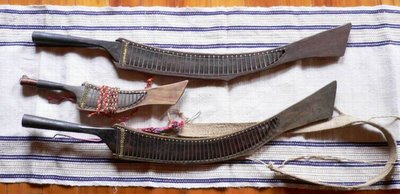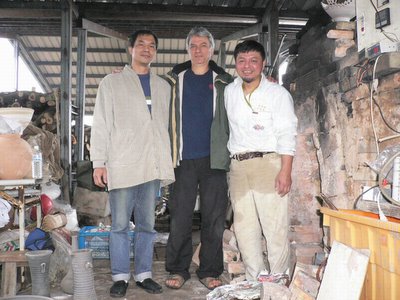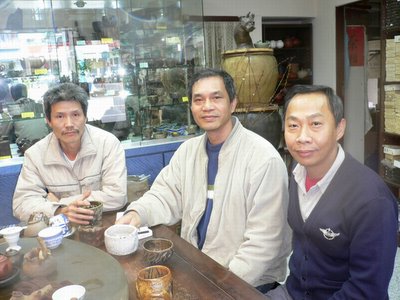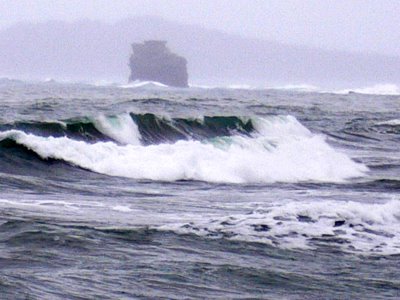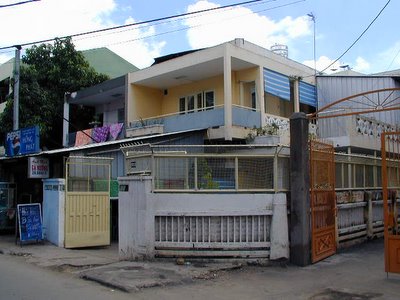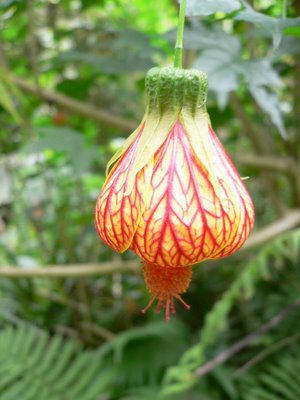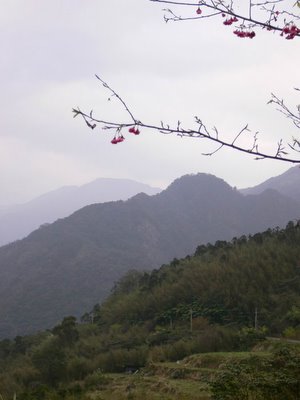Pintriqan Musya na mrhuw Mona Utaw, sgleng nya Tayal ru mlluhuw squ paris nha ciboq gipun tohuy. 莫那‧魯道務霧社起義抗日,雜貨商人巫金墩將店裡所有貨物捐給泰雅義軍,盡一己之力支持、鼓勵抗日英雄,因此後來被日本軍閥統治者關了好幾年。
有人說巫金墩是平地人;他是平埔族,不是漢人。不過,真是一條好漢。
Tuesday, February 28, 2006
Monday, February 27, 2006
From the news:
Iraq's defense minister warned of the risk of a "civil war" that "will never end" as sectarian violence flared again.
For this Bush has killed thousands of American soldiers, alienated allies, weakened the country’s international prestige, and depleted the treasury.
To paraphrase Country Joe and the Fish,
For it's 1, 2, 3, what are we fighting for?
Don't ask me, I don't give a damn,
It's worse than Viet Nam.
For it's 5, 6, on your way to heaven,
Stop by in Iraq,
You won't come back,
Whoopee, we're all going to die!
"We" of course refers to the valiant young people whose fathers did not hide them in the Texas National Guard. American soldiers have my greatest respect, and my greatest sympathy. I wish no more would die.
Iraq's defense minister warned of the risk of a "civil war" that "will never end" as sectarian violence flared again.
For this Bush has killed thousands of American soldiers, alienated allies, weakened the country’s international prestige, and depleted the treasury.
To paraphrase Country Joe and the Fish,
For it's 1, 2, 3, what are we fighting for?
Don't ask me, I don't give a damn,
It's worse than Viet Nam.
For it's 5, 6, on your way to heaven,
Stop by in Iraq,
You won't come back,
Whoopee, we're all going to die!
"We" of course refers to the valiant young people whose fathers did not hide them in the Texas National Guard. American soldiers have my greatest respect, and my greatest sympathy. I wish no more would die.
Sunday, February 26, 2006
Janis on my mind
Janis Joplin died in 1970 at the age of 27. With the money she made singing, she was able to buy such good heroin that she killed herself with it.
Her singing was definitely not easy listening. A lot of people didn't like her, because her music was so wild and so demanding. To me, she was god.
That line from Bobby McGee:
Freedom's just another word for nothing left to lose.
Is that depressing or liberating? I've never been able to figure it out.
Janis Joplin died in 1970 at the age of 27. With the money she made singing, she was able to buy such good heroin that she killed herself with it.
Her singing was definitely not easy listening. A lot of people didn't like her, because her music was so wild and so demanding. To me, she was god.
That line from Bobby McGee:
Freedom's just another word for nothing left to lose.
Is that depressing or liberating? I've never been able to figure it out.
Saturday, February 25, 2006
Thursday, February 23, 2006
For the human race, cultural evolution long ago superseded biological evolution. For instance, many, many years ago our ancestors faced population pressure. An animal subject to biological evolution would have had to either reduce its numbers, adapt to other sources of food, or move into hospitable lands. The human race moved into cold, inhospitable lands, where biological evolution would have required us to grow warm pelts; our digestive systems would have had to adapt to the different food in the strange land. Instead, human beings put on clothing to adjust the microclimate and cooked food to adjust it to our digestion. We did not adapt to our environment; we used our culture (technology) to adapt our environment to us.
Tools are indispensable in this process. The more sophisticated tools become, the less intelligence is required to use them. (Wow, Victorian anthropologists would have loved to hear me say that!) Consider a leisure, high status occupation that approaches religious prestige: hunting. Male dominated academic studies focus on the importance of hunting, and it has been undeniably important in regulating the hierarchy; this is a serious exposition, so we will not make any jokes about Vice Presidents weeding out lawyers. It also keeps the men out of the women's hair while the women go about the vital task of foraging and gathering; the human race has always relied mainly on vegetable matter to keep body and soul together. Meat has always been a frill, a status symbol, not a main source of nutrition (Inuit excepted, because they had no plants.)
Be that as it may, a Stone Age hunter required a vast array of complex skills. Consider a hunter with a bow and arrow. First, he had to know which wood to use to make his bow and arrows, when to harvest it, how to process it, and how to fashion the materials into usable tools. Years of practice were required for proficiency in the use of these weapons. Then, he had to know which animals to hunt, where, and how. Since an arrow does not fly very hard or very fast, he needed the stealth to approach close to the animal. The arrows would usually not bring down the prey at once. The prey would run, and the hunter required incredible skills to follow it. From the footsteps, he would judge more than which direction his game had gone: he could tell how fast it was moving, and whether the wound had been superficial or deadly. From grasses and twigs the animal brushed in passing, the hunter ascertained what part of the animal had been hit and how deeply; how long before it had passed; how steady its pace was, and so forth. Only in this way could he track down the animal.
Compare this to the modern hunter who gets out his credit card and buys a gun. He may consult friends and consumer indexes for which brand to buy, and may spend time at the firing range getting used to the sniper's scope. Then, if he is rich and prestigious, his guide escorts him to a stand where he fires at animals lured into position. His rifle is so powerful that the animal drops dead in its tracks. Which requires more intelligence and skill?
This is why I say, The more sophisticated tools become, the less intelligence is required to use them.
Just think of WordStar. You had to memorize a whole list of commands to use that early word processor, popular before the mouse had been invented. Now you can use a word processor like Word with just a few minutes training. Point and click. Duh, now what? Oh yeah, write something. Uhhh ~~~
Tools are indispensable in this process. The more sophisticated tools become, the less intelligence is required to use them. (Wow, Victorian anthropologists would have loved to hear me say that!) Consider a leisure, high status occupation that approaches religious prestige: hunting. Male dominated academic studies focus on the importance of hunting, and it has been undeniably important in regulating the hierarchy; this is a serious exposition, so we will not make any jokes about Vice Presidents weeding out lawyers. It also keeps the men out of the women's hair while the women go about the vital task of foraging and gathering; the human race has always relied mainly on vegetable matter to keep body and soul together. Meat has always been a frill, a status symbol, not a main source of nutrition (Inuit excepted, because they had no plants.)
Be that as it may, a Stone Age hunter required a vast array of complex skills. Consider a hunter with a bow and arrow. First, he had to know which wood to use to make his bow and arrows, when to harvest it, how to process it, and how to fashion the materials into usable tools. Years of practice were required for proficiency in the use of these weapons. Then, he had to know which animals to hunt, where, and how. Since an arrow does not fly very hard or very fast, he needed the stealth to approach close to the animal. The arrows would usually not bring down the prey at once. The prey would run, and the hunter required incredible skills to follow it. From the footsteps, he would judge more than which direction his game had gone: he could tell how fast it was moving, and whether the wound had been superficial or deadly. From grasses and twigs the animal brushed in passing, the hunter ascertained what part of the animal had been hit and how deeply; how long before it had passed; how steady its pace was, and so forth. Only in this way could he track down the animal.
Compare this to the modern hunter who gets out his credit card and buys a gun. He may consult friends and consumer indexes for which brand to buy, and may spend time at the firing range getting used to the sniper's scope. Then, if he is rich and prestigious, his guide escorts him to a stand where he fires at animals lured into position. His rifle is so powerful that the animal drops dead in its tracks. Which requires more intelligence and skill?
This is why I say, The more sophisticated tools become, the less intelligence is required to use them.
Just think of WordStar. You had to memorize a whole list of commands to use that early word processor, popular before the mouse had been invented. Now you can use a word processor like Word with just a few minutes training. Point and click. Duh, now what? Oh yeah, write something. Uhhh ~~~
Wednesday, February 22, 2006
逛書店時,看到宜蘭專刊十大冊,有宜蘭縣生活技能、宜蘭縣民間信仰、宜蘭縣基督教傳教史、宜蘭縣口述文學等等。十大本。
先翻一翻「民間信仰」,發現裡面講的都是中國大陸傳來的道廟,看不到臺灣自己民間信仰的蛛絲馬跡。後來想,大概是因為泰雅幾乎都改信耶穌了,教會不許他們傳自己的信仰。所以把「基督教傳教史」抽出來翻,這樣翻一翻,只看到漢人與洋人,看不到泰雅。怪。
「宜蘭縣歷史」有兩張原住民的照片,接著是蛤蟆蘭族賣地契,然後只有中國大陸來的人事記載。地拿到手就不理老地主了,不聞不問。我猜是編者對原有的臺灣人沒有興趣、懶得想、不肯了解。
再把「生活技能」拿出來,只有中國大陸傳來的技藝,看不到泰雅。不會是我記錯吧,宜蘭縣原住民很多吧,我認識很多宜蘭來的達燕、Sateq,怎麼在書上沒有留下痕跡?講本土是中國大陸來的漢人的專利嗎?是不是太漠視原住民的存在?編這套書的人,知不知道宜蘭有原住民?或者有族群優越感、蔑視弱小民族?
好吧,看看「口述文學」,總于找到一篇『漢人眼中的泰雅族』。只有漢人眼中的泰雅族,沒有找到泰雅眼中的漢人,好像地主沒有發言權。也罷,寥勝于無,看到「泰雅」字樣該滿足了。漢人眼中的泰雅族,1993年記述,第一句:
「生番的祖先是狗。」
先翻一翻「民間信仰」,發現裡面講的都是中國大陸傳來的道廟,看不到臺灣自己民間信仰的蛛絲馬跡。後來想,大概是因為泰雅幾乎都改信耶穌了,教會不許他們傳自己的信仰。所以把「基督教傳教史」抽出來翻,這樣翻一翻,只看到漢人與洋人,看不到泰雅。怪。
「宜蘭縣歷史」有兩張原住民的照片,接著是蛤蟆蘭族賣地契,然後只有中國大陸來的人事記載。地拿到手就不理老地主了,不聞不問。我猜是編者對原有的臺灣人沒有興趣、懶得想、不肯了解。
再把「生活技能」拿出來,只有中國大陸傳來的技藝,看不到泰雅。不會是我記錯吧,宜蘭縣原住民很多吧,我認識很多宜蘭來的達燕、Sateq,怎麼在書上沒有留下痕跡?講本土是中國大陸來的漢人的專利嗎?是不是太漠視原住民的存在?編這套書的人,知不知道宜蘭有原住民?或者有族群優越感、蔑視弱小民族?
好吧,看看「口述文學」,總于找到一篇『漢人眼中的泰雅族』。只有漢人眼中的泰雅族,沒有找到泰雅眼中的漢人,好像地主沒有發言權。也罷,寥勝于無,看到「泰雅」字樣該滿足了。漢人眼中的泰雅族,1993年記述,第一句:
「生番的祖先是狗。」
Tuesday, February 21, 2006
Monday, February 20, 2006
現在臺灣學英文的風氣,有點沒頭沒腦亂抓,大家趕快學英文呀!趕快學英文,不要問為什麼,不要問怎麼學,這個方法學不好,趕快換一個方法好了,全島各各角落到處貼不成英文的英文來提升國民英文能力,大家趕快學英文呀!
第一個要提的問題是,「全民」有必要學英文嗎?國中義務教育培養出一個普遍的基本實力,再來大學生、研究生能讀專業領域原文書,另外栽培專攻英文的精英,應該比較合理。(當然,目前本島政治環境內,合理不合理不是一個重要攷量,尤其執政者盡量洋化、否定華夏的氣氛下。)
其實,二00三年是英文的高峰;當年全世界學英文的人數最多,接著直線下降。現在,全世界學中文的人數直升。歐美報章雜誌強調,年輕人要有前途,必須學中文。聽說現在Chicago首輪高中裡,中文已經是必修課程。
管它的。臺灣的可愛,就是很有個性,不管外面的世界是怎麼樣,自己認為怎麼樣才算數。所以說,管它的,大家趕快學英文呀!趕快學英文,不要問為什麼,大家趕快學英文呀!
第一個要提的問題是,「全民」有必要學英文嗎?國中義務教育培養出一個普遍的基本實力,再來大學生、研究生能讀專業領域原文書,另外栽培專攻英文的精英,應該比較合理。(當然,目前本島政治環境內,合理不合理不是一個重要攷量,尤其執政者盡量洋化、否定華夏的氣氛下。)
其實,二00三年是英文的高峰;當年全世界學英文的人數最多,接著直線下降。現在,全世界學中文的人數直升。歐美報章雜誌強調,年輕人要有前途,必須學中文。聽說現在Chicago首輪高中裡,中文已經是必修課程。
管它的。臺灣的可愛,就是很有個性,不管外面的世界是怎麼樣,自己認為怎麼樣才算數。所以說,管它的,大家趕快學英文呀!趕快學英文,不要問為什麼,大家趕快學英文呀!
Sunday, February 19, 2006
Saturday, February 18, 2006
Daybreak at Tienchih
I wrote this in October 1983 after a hike near Nenggao 能高山 and Nanhua 南華mountains.
Bamboo green Nenggao peak on the south edge of the Hualien divide, clad in the pink dawn sunlight, proclaimed the morn. To the left of where I stood enraptured, thick pine forests climbed the steep edge of Nanhua to timberline; high overhead, the rocks of the peak were distinct in the first light. The valley fell away below my feet to the stream so far below. From the rockstrewn streambed, the Nenggao wall rose to a line of grey peaks turning green as they caught the sun. To my right, slightly misted mountains lay still in predawn silence, layer upon layer of ridged summits receding west into lowland morning fog. Behind me I could hear the waterfall as it bounded down the defile from its spring high above at Chilai South Peak.
Behind me I couldn't stop hearing the hiking team waking up, breaking camp, washing, cooking, all with military order, and military lack of concern for their surroundings.
I turned my attention to them. They were lost in their routine, oblivious to the glory of the day. I was amused and distressed. Why bother to come if you're not going to use your eyes? It's no easy hike to get this view.
Two young women had broken away from the morning drill to sit quietly on the edge of the flat ground, facing that breath-taking valley and the advent of morning on the Nenggao range.
Kindred spirits. I was warmed to think that, after all, there were some who could appreciate the superb scenery.
Then I saw the mirrors they held before their eyes, and the makeup brushes they were applying with such skill and concentration.
I wrote this in October 1983 after a hike near Nenggao 能高山 and Nanhua 南華mountains.
Bamboo green Nenggao peak on the south edge of the Hualien divide, clad in the pink dawn sunlight, proclaimed the morn. To the left of where I stood enraptured, thick pine forests climbed the steep edge of Nanhua to timberline; high overhead, the rocks of the peak were distinct in the first light. The valley fell away below my feet to the stream so far below. From the rockstrewn streambed, the Nenggao wall rose to a line of grey peaks turning green as they caught the sun. To my right, slightly misted mountains lay still in predawn silence, layer upon layer of ridged summits receding west into lowland morning fog. Behind me I could hear the waterfall as it bounded down the defile from its spring high above at Chilai South Peak.
Behind me I couldn't stop hearing the hiking team waking up, breaking camp, washing, cooking, all with military order, and military lack of concern for their surroundings.
I turned my attention to them. They were lost in their routine, oblivious to the glory of the day. I was amused and distressed. Why bother to come if you're not going to use your eyes? It's no easy hike to get this view.
Two young women had broken away from the morning drill to sit quietly on the edge of the flat ground, facing that breath-taking valley and the advent of morning on the Nenggao range.
Kindred spirits. I was warmed to think that, after all, there were some who could appreciate the superb scenery.
Then I saw the mirrors they held before their eyes, and the makeup brushes they were applying with such skill and concentration.
Friday, February 17, 2006
I stopped by Takyu's place on an errand after dinner. Abus's 6 year old daughter, World, appeared out of the darkness and slipped her hand into mine. "Yugan, Daddy is home, why don't you come visit?" In a moment, Takyu's granddaughter, about the same age, took my other hand.
"Yugan, you have to carry us piggyback!”
"Do I have to?”
"Yes, get down, let us climb up." Once they were holding on tight, I wiggled and jiggled and threatened to throw them over the side of the road into Abus's duck pond below. They shrieked into my ears with excitement until I was sure I would go deaf. Tlahuy and Yumin scampered back and forth. A little boy I do not know, maybe Hayay's son, about 3 years old, climbed up World's legs among great hilarity. Qosun threw down his little bike and jumped on. Now I know how Yumin feels when he gets fleas. There may have been a fifth back there. It was dark, and I couldn't turn my head to count. I trudged up to Abus's house chanting, "Come take your pick, 50NT for one, 3 for NT100, buy two and get one free!”
"Yugan, you have to carry us piggyback!”
"Do I have to?”
"Yes, get down, let us climb up." Once they were holding on tight, I wiggled and jiggled and threatened to throw them over the side of the road into Abus's duck pond below. They shrieked into my ears with excitement until I was sure I would go deaf. Tlahuy and Yumin scampered back and forth. A little boy I do not know, maybe Hayay's son, about 3 years old, climbed up World's legs among great hilarity. Qosun threw down his little bike and jumped on. Now I know how Yumin feels when he gets fleas. There may have been a fifth back there. It was dark, and I couldn't turn my head to count. I trudged up to Abus's house chanting, "Come take your pick, 50NT for one, 3 for NT100, buy two and get one free!”
Thursday, February 16, 2006
Writing about my arrival in Asia has triggered memories.
Some teenagers in the neighborhood, Phu Nhuan, called me over to their place one evening a few weeks after I arrived in Saigon. They explained they wanted my help in stealing some mangoes. With my taller frame and longer arms, they figured I would be able to reach over from their balcony to pluck mangoes from their neighbor's tree. However, between their basic English and my basic Viet Namese, they warned me to be quick and not be seen, or else the guy whose tree it was would shoot me to death. That was no idle threat. The man kept an M16 at home, and we had heard him shooting at prowlers. With the war going on, everybody had good reason to shoot suspicious figures lurking in the night. I had never eaten a mango, and they looked delicious, so I figured it was worth the risk. It was as close to rock climbing as I was likely to get in Saigon, which was another good reason. We went up to their balcony. They clung to my left wrist. I gingerly leaned over and cleaned the man's tree without his knowing it. The fruit was especially tasty, well worth the risk, tart and sweet, and I had made some of my first friends in Asia.
Some teenagers in the neighborhood, Phu Nhuan, called me over to their place one evening a few weeks after I arrived in Saigon. They explained they wanted my help in stealing some mangoes. With my taller frame and longer arms, they figured I would be able to reach over from their balcony to pluck mangoes from their neighbor's tree. However, between their basic English and my basic Viet Namese, they warned me to be quick and not be seen, or else the guy whose tree it was would shoot me to death. That was no idle threat. The man kept an M16 at home, and we had heard him shooting at prowlers. With the war going on, everybody had good reason to shoot suspicious figures lurking in the night. I had never eaten a mango, and they looked delicious, so I figured it was worth the risk. It was as close to rock climbing as I was likely to get in Saigon, which was another good reason. We went up to their balcony. They clung to my left wrist. I gingerly leaned over and cleaned the man's tree without his knowing it. The fruit was especially tasty, well worth the risk, tart and sweet, and I had made some of my first friends in Asia.
Wednesday, February 15, 2006
But seriously, what would happen if (not to wish bad things about anybody, even a Republican lawyer who chums around the White House) if, dog forbid, the guy died? Would they try the Vice President for manslaughter? Can you imagine the VP in an orange jumpsuit, some heavy case's plaything as he does hard time?
No, of course you can't, because VPs don't go to jail. You and I, we go out and shoot a buddy without a quail license, we'd be looking at a five hundred dollar fine, at least. Cheney gets out his checkbook and very righteously writes a seven dollar check to retroactively pay for the license. Fiddlesticks.
No, of course you can't, because VPs don't go to jail. You and I, we go out and shoot a buddy without a quail license, we'd be looking at a five hundred dollar fine, at least. Cheney gets out his checkbook and very righteously writes a seven dollar check to retroactively pay for the license. Fiddlesticks.
Tuesday, February 14, 2006
A new slogan for the NRA:
Guns don't shoot people,
Vice Presidents shoot people.
Vice President Cheney's approval ratings have been soaring since the news came out that he shot an attorney, which is a secret desire most Americans harbor. 803 informs me that the shootee had just told Cheney that he planned to vote for a Democrat in the next election.
At least with Jerry Ford, it was just a tennis ball.
Guns don't shoot people,
Vice Presidents shoot people.
Vice President Cheney's approval ratings have been soaring since the news came out that he shot an attorney, which is a secret desire most Americans harbor. 803 informs me that the shootee had just told Cheney that he planned to vote for a Democrat in the next election.
At least with Jerry Ford, it was just a tennis ball.
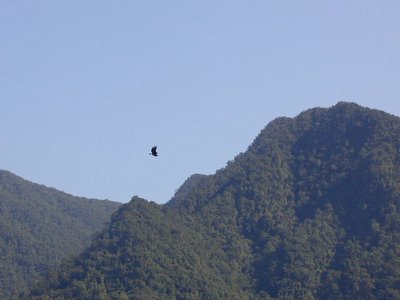
Mnnaq slawa ru laga na gwari.
On February 3, I mentioned that an eagle flew to the camphor tree uphill and cooed; I had never heard an eagle coo.
This morning at 10, I heard an eagle coo in the camphor tree; the same eagle, I would assume. Then it flew off, but it fluttered its wings. Eagles rarely flap their wings, and this is the first time I have ever seen an eagle flutter its wings. Some sort of iconoclast, perhaps.
And it was an eagle in a camphor tree, not a partridge in a pear tree. Different holiday. Maybe this eagle was doing the eagle's Valentine's Day dance?
Monday, February 13, 2006
On the first Thursday of November, 1970, Mom had momentous news when she picked me up from my job teaching Kenpo at Ed Parker's karate studio. Uncle Jim had sent a telegram announcing his arrival in LA, so she had gone to meet him. He was a contractor in Viet Nam then, mostly electronics, and he won a contract to supply our fighting men with pizzas. I have always suspected that he won the contract by accident. Be that at it may, he needed staff to set up his bakery, so Mom was in Saigon by Thanksgiving. I was in the 12th grade at Pasadena High; I arranged for an early graduation.
For three days after the semester ended, I stayed at Josh Potter's. For the last time, I rode my blue Peugeot bicycle, to get my final inoculations. In those days, your yellow book was as important as your passport: a lost phrase, the yellow book: your record of immunizations and inoculations. I enjoyed the odd freedom of being out on the streets during school hours. Josh drove me to the airport, and I left LA. It would be 25 years before I returned for a visit.
I flew to SF to stay with Steph as I got my visa at the VN consulate there. This was only 3 years after the Tet attacks of 1968, so Jim and Mom told me to stay in the US until after Tet (春節).
Finally, the big day came: my first international flight. Steph, Gary, and Trin saw me off at SF International. I flew to Honolulu. The Filipino baby boy in the next seat cried all the way. They served us breakfast before we landed. The next leg of the voyage landed us in Guam. The baby boy in the next seat cried all the way. They served us breakfast before we landed. Then we flew to Manila. The baby boy in the next seat cried all the way. They served us breakfast before we landed. The baby boy in the next seat got off, at last. He was still crying. Then we flew to Saigon. They served us breakfast before we landed. 24 hours after I embarked in SF, Mom picked me up at Tan Son Nhut Airport on the morning of February 13. She took me to downtown Saigon, to the Blue Diamond, and we had breakfast. I was getting pretty tired of eating breakfast.
That was February 13, 1971, 35 years ago today. Mom showed me around Saigon. Different smells, different heat, different sunlight. As a boy, I had traveled all over the US, but I had never seen the green of Southeast Asia. Different traffic, full of motorcycles, pedicabs, cyclos, and lambros dodging rice trucks, jeeps, and tanks. Armed soldiers everywhere with their fingers on their triggers. The sounds of Viet Namese, which I had never heard before; signs in Viet Namese, English, Chinese, French.
We had dinner at Uncle Jim's villa. Halfway through, jet lag caught up with me. My face almost landed in my plate. We went to the bakery, which was to be our home. I was shown my room, given stern instructions to brush my teeth only with bottled water, and issued a whiskey bottle full of rusty water which was allegedly safer than tap water. I made it to the bed before sleep hit me.
Late at night, I woke up. I peeked out the barred window at the empty street below. Soon I heard a vehicle coming. A heavily armored American jeep rumbled by on patrol. The soldiers were alert. The man in the back had his hands at his quad 40 machine guns, ready to fire. They didn't see me watching them pass under the streetlights.
I fell asleep again, and was awakened shortly after dawn by the call of a peddler hawking something to eat. For some inexplicable reason, I felt that I had found where I belong.
For three days after the semester ended, I stayed at Josh Potter's. For the last time, I rode my blue Peugeot bicycle, to get my final inoculations. In those days, your yellow book was as important as your passport: a lost phrase, the yellow book: your record of immunizations and inoculations. I enjoyed the odd freedom of being out on the streets during school hours. Josh drove me to the airport, and I left LA. It would be 25 years before I returned for a visit.
I flew to SF to stay with Steph as I got my visa at the VN consulate there. This was only 3 years after the Tet attacks of 1968, so Jim and Mom told me to stay in the US until after Tet (春節).
Finally, the big day came: my first international flight. Steph, Gary, and Trin saw me off at SF International. I flew to Honolulu. The Filipino baby boy in the next seat cried all the way. They served us breakfast before we landed. The next leg of the voyage landed us in Guam. The baby boy in the next seat cried all the way. They served us breakfast before we landed. Then we flew to Manila. The baby boy in the next seat cried all the way. They served us breakfast before we landed. The baby boy in the next seat got off, at last. He was still crying. Then we flew to Saigon. They served us breakfast before we landed. 24 hours after I embarked in SF, Mom picked me up at Tan Son Nhut Airport on the morning of February 13. She took me to downtown Saigon, to the Blue Diamond, and we had breakfast. I was getting pretty tired of eating breakfast.
That was February 13, 1971, 35 years ago today. Mom showed me around Saigon. Different smells, different heat, different sunlight. As a boy, I had traveled all over the US, but I had never seen the green of Southeast Asia. Different traffic, full of motorcycles, pedicabs, cyclos, and lambros dodging rice trucks, jeeps, and tanks. Armed soldiers everywhere with their fingers on their triggers. The sounds of Viet Namese, which I had never heard before; signs in Viet Namese, English, Chinese, French.
We had dinner at Uncle Jim's villa. Halfway through, jet lag caught up with me. My face almost landed in my plate. We went to the bakery, which was to be our home. I was shown my room, given stern instructions to brush my teeth only with bottled water, and issued a whiskey bottle full of rusty water which was allegedly safer than tap water. I made it to the bed before sleep hit me.
Late at night, I woke up. I peeked out the barred window at the empty street below. Soon I heard a vehicle coming. A heavily armored American jeep rumbled by on patrol. The soldiers were alert. The man in the back had his hands at his quad 40 machine guns, ready to fire. They didn't see me watching them pass under the streetlights.
I fell asleep again, and was awakened shortly after dawn by the call of a peddler hawking something to eat. For some inexplicable reason, I felt that I had found where I belong.
Sunday, February 12, 2006
Saturday, February 11, 2006
Friday, February 10, 2006
Cool weather, about 12C this afternoon and dropping. The sun burst through the clouds for a moment at noon. The afternoon was cloudy but not dreary. The mountains were muffled in mists that muted the colors, except for the stipples of light green where camphor trees are budding. I wanted to catch the 5:15 bus to New Store for my pottery class, but I was a bit late, so I was walking briskly. To keep up a good pace, I sang Peggy of Fife, and then Kevin Barry. I followed that with The Rising of the Moon, and then Tipperary. Tipperary sounded good. I finished as I passed the defunct toll booth, and decided to sing it again. I turned right onto the bridge just as I sang the first line,
The moon it shown down
and stopped dead in my tracks. The peak of Ulay Mountain, 700 meters overhead, was hushed in drapes of mists flowing in from Bucket Peak, a hundred meters higher than Ulay. Each valley showed a different tint of grey blue green, and the trees on each ridge stood clear in soft profile. The moon, three days shy of full, had just risen above the V between the peaks, with just enough light to stand away from the muted sky and to poke through the gentle mists.
Minutes later, I remembered to shut my mouth. If I live to be a hundred, I may be lucky enough to see something so beautiful again.
The moon it shown down
and stopped dead in my tracks. The peak of Ulay Mountain, 700 meters overhead, was hushed in drapes of mists flowing in from Bucket Peak, a hundred meters higher than Ulay. Each valley showed a different tint of grey blue green, and the trees on each ridge stood clear in soft profile. The moon, three days shy of full, had just risen above the V between the peaks, with just enough light to stand away from the muted sky and to poke through the gentle mists.
Minutes later, I remembered to shut my mouth. If I live to be a hundred, I may be lucky enough to see something so beautiful again.
Sometimes I really can't figure out what's going on. Ever since Apollo 11, the standard of education in the US has been leaping downhill like an Olympic slalom racer. It's like we accomplished what we wanted with the moon shot and moved on to other things. Now His Travesty, The Most Exalted President Bush proposes a budget slashing funds for education. He's eliminating programs he doesn't think are necessary, such as arts, math, technology, foreign language, and drug-free schools (of course we all understand why he isn't in favor of drug-free schools).
Ok, sure, you can't be using money on kids when you could be spending that money for the war in Iraq. Think of all the Iraqis you could shoot for the price of a junior high school laboratory that the kids wouldn't appreciate anyway. American kids don't want an education, they want the latest basketball shoes. With fries. What do we need with arts, or math, or technology? Just outsource them. Foreign languages? You should hear some of those Indians on support lines, you would swear they grew up in Ohio. So why bother with foreign languages?
In the meantime, on another front, parents in California are preparing to sue the State, because California law requires students to pass tests to graduate from high school. They say it's unfair that their kids have to be able to read and write to graduate from high school, because it's hard to get a job without a high school diploma.
Well, duh! Some people have jellyfish where their brains should be. This kind of … no, I can't call it thinking…. cranial activity? …whatever… this kind of chaotic neuron firing shows precisely why standards in education are necessary: education is supposed to teach you how to think. They can't. Looks like the only job that'll be open for them is President of the US.
Ok, sure, you can't be using money on kids when you could be spending that money for the war in Iraq. Think of all the Iraqis you could shoot for the price of a junior high school laboratory that the kids wouldn't appreciate anyway. American kids don't want an education, they want the latest basketball shoes. With fries. What do we need with arts, or math, or technology? Just outsource them. Foreign languages? You should hear some of those Indians on support lines, you would swear they grew up in Ohio. So why bother with foreign languages?
In the meantime, on another front, parents in California are preparing to sue the State, because California law requires students to pass tests to graduate from high school. They say it's unfair that their kids have to be able to read and write to graduate from high school, because it's hard to get a job without a high school diploma.
Well, duh! Some people have jellyfish where their brains should be. This kind of … no, I can't call it thinking…. cranial activity? …whatever… this kind of chaotic neuron firing shows precisely why standards in education are necessary: education is supposed to teach you how to think. They can't. Looks like the only job that'll be open for them is President of the US.
Thursday, February 09, 2006
The world is such a confusing place. To protest a cartoon in a Danish newspaper depicting Islam as a violent religion, Muslims riot, kill innocent people, attack embassies, and assault a US army base.
The Danish journalists have received death threats. That should teach them to insinuate that Muslims are violent! However, the cartoons would not have received second notice if not for the hard work of Ahmed Abu Laban, the religious director of the Muslim Society in Copenhagen, who evidently endeavored to stir this up. It's interesting to hear him try to dismount the tiger now:
http://www.npr.org/templates/story/story.php?storyId=5195798
The Danish journalists have received death threats. That should teach them to insinuate that Muslims are violent! However, the cartoons would not have received second notice if not for the hard work of Ahmed Abu Laban, the religious director of the Muslim Society in Copenhagen, who evidently endeavored to stir this up. It's interesting to hear him try to dismount the tiger now:
http://www.npr.org/templates/story/story.php?storyId=5195798
Wednesday, February 08, 2006
Tuesday, February 07, 2006
百行,孝為先。
甚麼叫做孝?
對父母好。
怎麼樣才是對父母好?
要孝順父母,就是對父母好。
為甚麼要孝順父母?
因為百行,孝為先。
這種思攷邏輯對社會一點好處都沒有。人云亦云,要孝順父母,但是孝道是甚麼,就不肯用心思攷:這就不孝。孝經薄薄一本,起碼拿出來翻一翻再噴飛口沫,可以吧。
如果父母要講孝,家庭教育已經告失敗。孝應該是子女理所當然流露出的,由衷的敬愛之心…講到此,好像已經跟現實開始脫節。現在家庭已不像已前,為生活重心。孩子生出來放小床跟父母隔離,喝奶粉長大,趕快送去給保母、托兒所、幼稚園、安親班、補習班管,然後責求孩子孝順。要求孝順,在很多父母嘴裡的意義有兩種:一、薪水帶回家敬奉父母;二、傳宗接代,生個寶寶,讓兩個老的有個玩具在鄰居面前炫。這種人常用一句壓人,不孝有三,喂喂喂,另外兩個是甚麼?管它的,生個寶寶來玩一玩。
不孝有三,這句不是孔子講的,是魯蛋弟子曾驂說的。曾驂對孝的觀念,總是很偏的,可能是因為是被虐兒童,長大成人,父親還是把他當出氣桶,拿棍子打,打到昏過去,快出人命了,驂以為忍住不逃就是孝順。這件事被孔子知道了,差點把曾驂開除,很誠摯地問他,你頭腦壞掉了是嗎?你以為你這樣算是孝順嗎?
真正孝順,是要量狀況而為。不忠不孝,不是人;但是盲目效忠、愚蠢孝順,對國家社會家庭有損無益。
甚麼叫做孝?
對父母好。
怎麼樣才是對父母好?
要孝順父母,就是對父母好。
為甚麼要孝順父母?
因為百行,孝為先。
這種思攷邏輯對社會一點好處都沒有。人云亦云,要孝順父母,但是孝道是甚麼,就不肯用心思攷:這就不孝。孝經薄薄一本,起碼拿出來翻一翻再噴飛口沫,可以吧。
如果父母要講孝,家庭教育已經告失敗。孝應該是子女理所當然流露出的,由衷的敬愛之心…講到此,好像已經跟現實開始脫節。現在家庭已不像已前,為生活重心。孩子生出來放小床跟父母隔離,喝奶粉長大,趕快送去給保母、托兒所、幼稚園、安親班、補習班管,然後責求孩子孝順。要求孝順,在很多父母嘴裡的意義有兩種:一、薪水帶回家敬奉父母;二、傳宗接代,生個寶寶,讓兩個老的有個玩具在鄰居面前炫。這種人常用一句壓人,不孝有三,喂喂喂,另外兩個是甚麼?管它的,生個寶寶來玩一玩。
不孝有三,這句不是孔子講的,是魯蛋弟子曾驂說的。曾驂對孝的觀念,總是很偏的,可能是因為是被虐兒童,長大成人,父親還是把他當出氣桶,拿棍子打,打到昏過去,快出人命了,驂以為忍住不逃就是孝順。這件事被孔子知道了,差點把曾驂開除,很誠摯地問他,你頭腦壞掉了是嗎?你以為你這樣算是孝順嗎?
真正孝順,是要量狀況而為。不忠不孝,不是人;但是盲目效忠、愚蠢孝順,對國家社會家庭有損無益。
Monday, February 06, 2006
pointed remarks on censorship
A furor has risen over American Internet companies complying with PRC requirements that they censor the Web in communist China. While I do not intend to be an apologist for any company or any government, I think the situation warrants another look.
The first point to remember is that world leaders dread political instability in China, and will go to any lengths to avoid the possibility of, say, eighty million Chinese refugees fleeing the country. Make noise, but better to keep the communists in power and let them hold the lid on the pot.
The second point to remember is that the PRC government, like all governments, places great importance on face and maintaining appearances. Yowling that they are in charge satisfies fat cats.
The third point to remember is that the PRC government, Yahoo, and Microsoft all know better than you or I how cunning Chinese hackers are. Example: Microsoft introduced a new package – I recall it was Windows 2000 – with the boast that the encryption was so perfect and so unhackable that nobody would ever be able to pirate it. The gauntlet had been flung down; the race was on. Taiwan won, cracking the encryption early in the afternoon of the first day of issue, and hackers in the PRC cracked it an hour or two later.
So tell me how Yahoo and Google are going to keep determined Chinese computer users from finding whatever websites they please. I think this is just a face-saving device. American companies have put up some nominal barriers for the PRC government, they make their money, US lawmakers make their headlines by denouncing Bill Gates, and everybody is happy. It would be nice if freedom of speech were enjoyed by all people everywhere, but since it's not, I can say with reasonable assurance that at the moment I write this, hundreds of thousands of Chinese hackers are happily hacking their way through the Great Wall of Chinese Internet.
A furor has risen over American Internet companies complying with PRC requirements that they censor the Web in communist China. While I do not intend to be an apologist for any company or any government, I think the situation warrants another look.
The first point to remember is that world leaders dread political instability in China, and will go to any lengths to avoid the possibility of, say, eighty million Chinese refugees fleeing the country. Make noise, but better to keep the communists in power and let them hold the lid on the pot.
The second point to remember is that the PRC government, like all governments, places great importance on face and maintaining appearances. Yowling that they are in charge satisfies fat cats.
The third point to remember is that the PRC government, Yahoo, and Microsoft all know better than you or I how cunning Chinese hackers are. Example: Microsoft introduced a new package – I recall it was Windows 2000 – with the boast that the encryption was so perfect and so unhackable that nobody would ever be able to pirate it. The gauntlet had been flung down; the race was on. Taiwan won, cracking the encryption early in the afternoon of the first day of issue, and hackers in the PRC cracked it an hour or two later.
So tell me how Yahoo and Google are going to keep determined Chinese computer users from finding whatever websites they please. I think this is just a face-saving device. American companies have put up some nominal barriers for the PRC government, they make their money, US lawmakers make their headlines by denouncing Bill Gates, and everybody is happy. It would be nice if freedom of speech were enjoyed by all people everywhere, but since it's not, I can say with reasonable assurance that at the moment I write this, hundreds of thousands of Chinese hackers are happily hacking their way through the Great Wall of Chinese Internet.
Sunday, February 05, 2006
Saturday, February 04, 2006
Friday, February 03, 2006
This morning shortly after 10:30 I was surprised to hear two eagles calling on the slope north of my house, because it was drizzling and eagles rarely fly or announce their presence in rain. One was calling sharply, the other practically cooing. I have never heard eagles coo. Then the shrieker flew directly south, past the back of my house, and flew away. A few minutes later the other eagle flew clockwise around my house and perched on the big camphor tree, where it cooed for several minutes. I have never seen eagles behaving so.
Thursday, February 02, 2006
Wednesday, February 01, 2006
有一次我到六龜拜見廣欽老和尚時,來了三個中年佛子,程度都很高,各自準備了問題,與老和尚對對禪鋒。
他們問的問題都太深,記不得。我只記得第一位的問題的開始:假如有一個人,左手摸著非想天,右手摸著非非想天…天啊,問題又深又長,總于問完了,很滿意地看著老和尚,九十幾歲的老和尚回答:念佛。
第一個回到坐位,第二個上陣,問的問題更深更長,總于問完了,很滿意地看著老和尚,老和尚回答:念佛。
第二個回到坐位,第三個上陣,問的問題非常深非常長,總于問完了,很滿意地看著老和尚,老和尚回答:念佛。
第三個回到坐位。三個人排排坐,不講話,各擺深思狀。一回兒,老和尚似乎睡著了。片刻醒過來,站起來了,抖抖衣服,瞪三位飽學佛子,斥詈一句:妄想!走兩步又回頭,指著他們,厲聲補充說明:妄想!都是妄想!一搖一晃離去了。
他們問的問題都太深,記不得。我只記得第一位的問題的開始:假如有一個人,左手摸著非想天,右手摸著非非想天…天啊,問題又深又長,總于問完了,很滿意地看著老和尚,九十幾歲的老和尚回答:念佛。
第一個回到坐位,第二個上陣,問的問題更深更長,總于問完了,很滿意地看著老和尚,老和尚回答:念佛。
第二個回到坐位,第三個上陣,問的問題非常深非常長,總于問完了,很滿意地看著老和尚,老和尚回答:念佛。
第三個回到坐位。三個人排排坐,不講話,各擺深思狀。一回兒,老和尚似乎睡著了。片刻醒過來,站起來了,抖抖衣服,瞪三位飽學佛子,斥詈一句:妄想!走兩步又回頭,指著他們,厲聲補充說明:妄想!都是妄想!一搖一晃離去了。
Subscribe to:
Comments (Atom)
